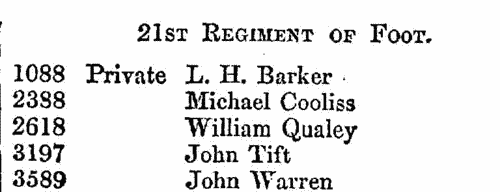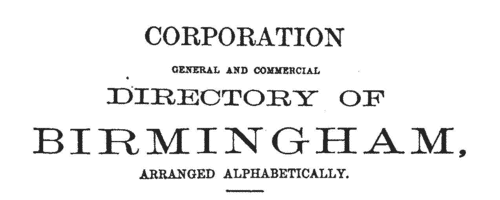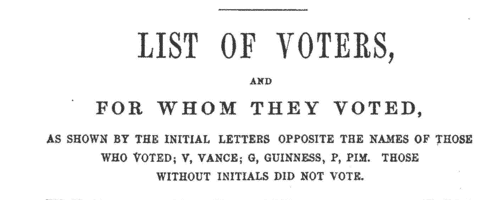Donegan Surname Ancestry ResultsOur indexes 1000-1999 include entries for the spelling 'donegan'. In the period you have requested, we have the following 77 records (displaying 11 to 20): Single Surname Subscription | | | Buying all 77 results of this search individually would cost £440.00. But you can have free access to all 77 records for a year, to view, to save and print, for £100. Save £340.00. More... |
These sample scans are from the original record. You will get scans of the full pages or articles where the surname you searched for has been found. Your web browser may prevent the sample windows from opening; in this case please change your browser settings to allow pop-up windows from this site. County Cork Freeholders: Booth No 6
(1841)
The poll books of voters in the parliamentary election for county Cork 13 to 15 July 1841 delivered in to the select committee that subsequently looked into the propriety of the proceedings, and then annotated with observations as to those votes to which objection had been raised. There are separate books for seven booths, with the electors' names in order of voting: giving each freeholder's full name, place of abode, situation of the freehold, value, number and date in the alphabetical registry book, and for which candidates they voted (Daniel O'Connell, Edmund Burke Roche, Nicholas Philpot Leader, and Robert Longfield). The seven booths are for these areas: 1. Duhallow barony; 2. Hall County Side, East East Carbery, West East Carbery and East West Carbery; 3. Barrymore and West West Carbery; 4. Condons and Fermoy; 5. Imokelly and West Muskerry.DONEGAN. Cost: £6.00.  | Sample scan, click to enlarge

|  London Policemen
(1830-1842) London Policemen
(1830-1842)
The Metropolitan Police Register of Joiners (MEPO 333/4) lists policemen joining the force through to 31 December 1842 (to warrant number 19892). The register is alphabetical, in so far as the recruits are listed chronologically grouped under first letter of surname. It is evidently a continuation of a similar earlier register, not closed until its alphabetical sections were filled: consequently, there are no entries in this register for the initial letters N, O, Q, U, V, X, Y or Z; and the sections of this register start at different dates - A 18 April 1840 (warrant number 16894); B 11 December 1830 (5570); C 7 September 1830 (4988); D 27 May 1833 (8445); E 15 December 1838 (14476); F 30 March 1832 (7372); G 1 December 1835 (11,184); H 25 April 1832 (7457); I and J 13 February 1837 (12449); K 2 January 1838 (13457); L 3 October 1834 (9905); M 15 November 1832 (7999); P 4 October 1831 (6869); R 4 September 1837 (13021); S 30 March 1835 (10366); T 6 April 1840 (16829); W 30 December 1833 (9096). The register gives Date of Appointment, Name, Number of Warrant, Cause of Removal from Force (resigned, dismissed, promoted or died), and Date of Removal. Although the register was closed for new entrants at the end of 1842, the details of removals were always recorded, some being twenty or more years later. Those recruits not formerly in the police, the army, or some government department, were required to provide (normally) at least two letters of recommendation from persons of standing, and details of these are entered on the facing pages: the names in these are indexed separately - this index refers only to the police constables. Where a recruit was only recently arrived in the metropolis, the names and addresses of the recommenders can be invaluable for tracing where he came from.DONEGAN. Cost: £8.00.  | Sample scan, click to enlarge

| Irish Insolvents
(1844)
Insolvency notices for Ireland: insolvency often caused people to restart their lives elsewhere, so these are an important source for lost links, especially for emigrantsDONEGAN. Cost: £6.00.  | Sample scan, click to enlarge

| Students entering the Albert National Agricultural Training Institution, Dublin
(1852)
This register of internal students gives full name; date of entry; date of leaving; time spent at the institution (in years and months); and, particularly interesting, 'destination of leaving' - such as 'Teacher in Tullamore Workhouse School', 'Emigrated to America', 'Agriculturist at Dunmanway'.DONEGAN. Cost: £6.00.  | Sample scan, click to enlarge

| British soldiers wounded at Inkerman
(1854)
Sebastopol in the Crimea was the great Russian naval arsenal on the Black Sea. A combined assault by British, French and Turkish troops resulted in the reduction of Sebastopol and led to the Treaty of Paris of 27 April 1856, guaranteeing the independence of the Ottoman Empire. In the battle of Inkerman, of November 1854, the Russian troops made an ultimately unsuccessful attack on the allied army. In December the War Office issued lists of soldiers killed and wounded at Inkerman: there are separate returns for 2 to 6 November, 7 to 20 November, and 21 to 26 November, as well as one for soldiers missing, and one for members of the Naval Brigade killed and wounded. This is the list of British soldiers wounded at Inkerman 2 to 6 November 1854.DONEGAN. Cost: £6.00.  | Sample scan, click to enlarge

|  Persons of standing recommending London police recruits
(1843-1857) Persons of standing recommending London police recruits
(1843-1857)
The Metropolitan Police Register of Joiners (MEPO 4/334) lists policemen joining the force 1 January 1843 to 1 April 1857 (warrant numbers 19893 to 35804). The register is alphabetical, in so far as the recruits are listed chronologically grouped under first letter of surname. It gives Date of Appointment, Name, Number of Warrant, Cause of Removal from Force (resigned, dismissed, promoted or died), and Date of Removal. Although the register was closed for new entrants at the end of 1842, the details of removals were always recorded, some being twenty or more years later. Those recruits not formerly in the police, the army, or some government department, were required to provide (normally) at least two letters of recommendation from persons of standing, and details of these are entered on the facing pages. Where a recruit was only recently arrived in the metropolis, the names and addresses of the recommenders can be invaluable for tracing where he came from. Those recruits not formerly in the police, the army, or some government department, were required to provide (normally) at least two letters of recommendation from persons of standing, and details of these are entered on the facing pages: the names in these are indexed here (the police recruits are indexed separately and not included here). Recruits transferred from other forces or rejoining the force did not normally need recommendations - in the latter case, former warrant numbers are given - but some recommendations are from police inspectors, even other constables. Recruits coming from the army sometimes have general military certificates of good conduct, but most often have a letter from their former commanding officer; recruits recommended by government departments (most often the Home Office) similarly have letters from the head of department. But the great majority of the names and addresses in these pages are of respectable citizens having some sort of personal acquaintance with the recruit. Where more than two recommendations were provided, the clerk would only record one or two, with the words 'and others'. Tradesmen are sometimes identified as such by their occupations; there are some gentry. Although the bulk of these names are from London and the home counties, a scattering are from further afield throughout Britain and Ireland. DONEGAN. Cost: £8.00.  | Sample scan, click to enlarge

|  British infantry fighting in China
(1856-1860) British infantry fighting in China
(1856-1860)
The China Medal was awarded to soldiers and sailors who took part in the prosecution of the war against the Chinese from 1856 to 1860. Separate clasps were awarded for men who had been in receipt of the China Medal of 1842; for being actually present at Canton on 28 and 29 December 1857, when that city was bombarded and finally captured; for being actually engaged in the operations which ceased with the first capture of the Taku Forts, 20 May 1858, and led to the Treaty of Tientsin; for being actually present at the capture of the Taku Forts 21 August 1860; and for being actually present before Pekin the day the gate of that city was given up to the allied (British and French) army, viz. on 13 October 1860. The 67th (The South Hampshire) Regiment of Foot, based at Athlone, embarked for India 18 September 1858, and was transferred to China in 1859, taking part in the capture of the Taku Forts and Pekin, and the operations against the Taiping rebels in 1862 to 1863: the right wing was moved to Japan in 1864 for the occupation of Yokohama. The regiment returned to the Cape of Good Hope in 1865, and back to Ireland in 1866.DONEGAN. Cost: £8.00.  | Sample scan, click to enlarge

| Residents and Traders in Birmingham
(1861)
William Cornish's Corporation General and Trades Directory covered Birmingham, Coventry and the towns of the Black Country. The Birmingham section contains both street lists and this general alphabetical directory. DONEGAN. Cost: £4.00.  | Sample scan, click to enlarge

| Victoria Intestates
(1864)
The probate courts of the Australian colonies furnished returns of estates of deceased intestates, giving full name, colonial residence, amount of the estate and how much had been disbursed and how. The date of death is often stated, and if by accident, suicide or crime. Names were carried forward from return to return until the estate was expended or exhausted. DONEGAN. Cost: £6.00.  | Sample scan, click to enlarge

| Dublin Electors
(1865)
This alphabetical list of electors for the City of Dublin for 1865 is annotated with details of the votes cast in the election of 15 July 1865 for a member of Parliament. The candidates were John Vance, Esq., D. L. (V), Benjamin Lee Guinness, Esq., D. L., LL. D. (G), and Jonathan Pim, Esq. (P). The first column gives, in bold, the initial of the ward in which lay the property that was the elector's qualification. The second column gives the elector's sequential number (alphabetically) within that ward. Then the elector's full name is given, surname first, and address, usually including house number. The votes cast are shown on the right: where these columns are blank, the elector did not vote. The key to the ward names is: A, South Dock; B, Donnybrook; C, Rathdown; D, Trinity; E, South City; F, Royal Exchange; G, Mansion House; H, Fitzwilliam; I, Wood Quay; K, Merchants' Quay; L, Usher's Quay; M, Arran Quay; N, Inns' Quay; O, North City; P, Rotundo; Q, Mountjoy; R; North Dock. S indicates the register of freemen.DONEGAN. Cost: £4.00.  | Sample scan, click to enlarge

|
Research your ancestry, family history, genealogy and one-name study by direct access to original records and archives indexed by surname.
|













